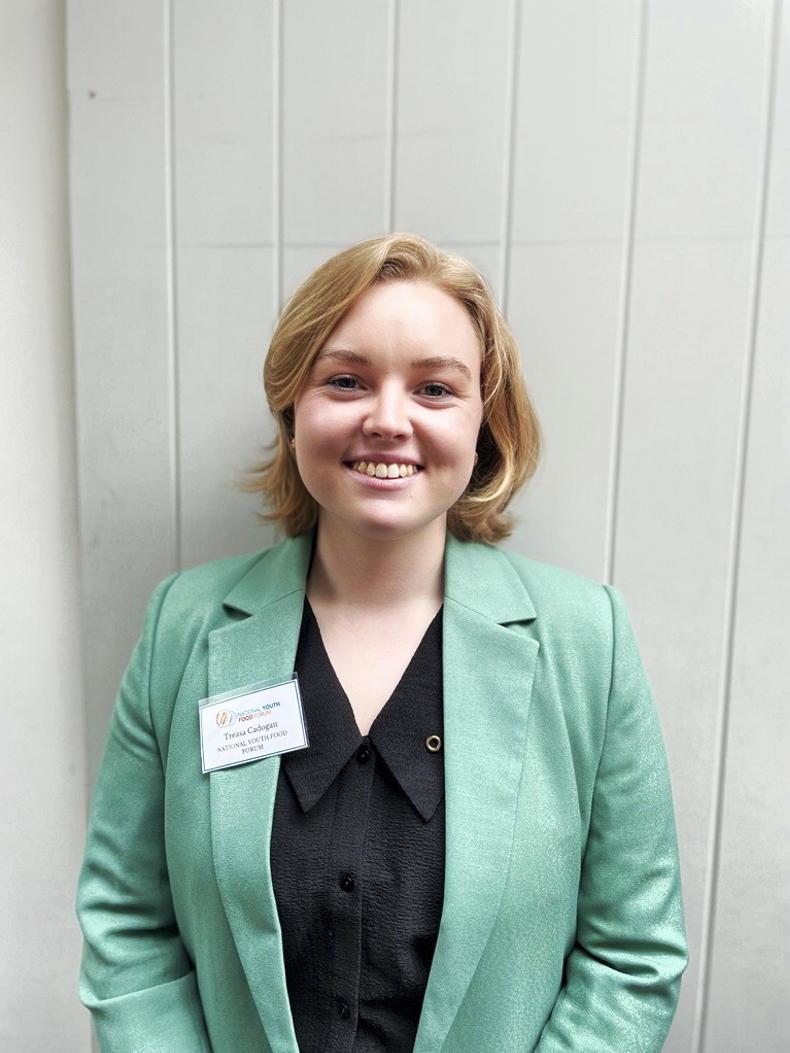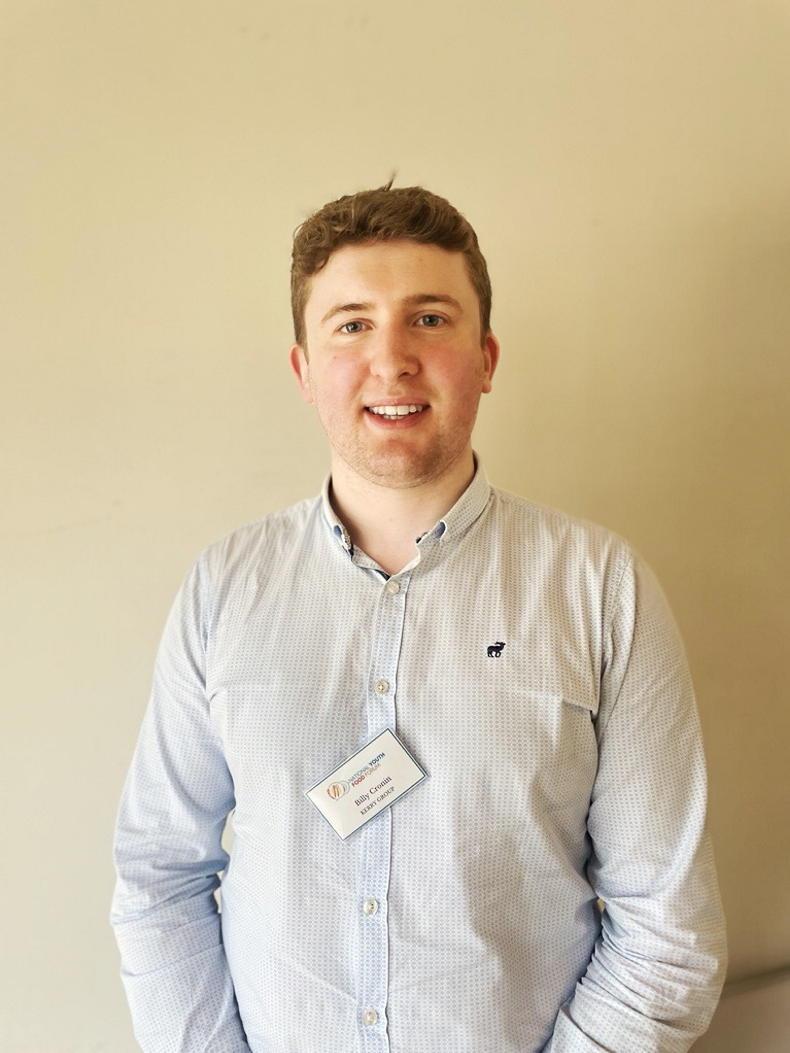The role of young people is essential in shaping a sustainable food system, as indicated by Ireland’s national agri-food strategy. Food Vision 2030 sets out the ambition for Ireland to be a leader in sustainable food systems including the “vital contribution of young people”.
The National Youth Food Forum is uniting young people aged 18-35, to learn, collaborate, share and engage in policy processes. This is being supported and funded by the Irish Forum for International Agricultural Development (IFIAD) and the Department of Agriculture, Food and Marine.
The first dialogue meeting took place on 3 April in Airfield Estate, Dublin, with over 25 delegates in attendance. Organising the forum was a team comprised of Treasa Cadogan, Noel Banville, David Giles and Caitlin Breen.
The forum aims to build on the existing momentum to better coordinate and leverage domestic and international opportunities for young people to engage in agri-food systems.
Establishing the forum, which is Ireland’s national chapter of the World Food Forum (WFF) was inspired by a buildup of events, according to Treasa.
Establishing a platform
The Department of Agriculture Food and the Marine and IFIAD have supported two delegations of young people engaged in the agrifood sector to attend the WFF at the Food and Agriculture Organisation of the United Nations headquarters in Rome in 2022 and 2023.
“The idea for the National Youth Food Forum came from discussions at the WFF of observations of both domestic and international platforms which have brought together groups, with an interest in both agriculture and environmentalism, in order to formulate a pragmatic route forward for agriculture to reach its climate goals, while also address other cultural issues which persist within the sector,” says Treasa.
After a few months of discussions and planning, Ireland’s National Youth Food Forum was launched in March.
“The Department of Agriculture really want to hear from young people, it’s in our national strategies. They’re more than happy to fund us, if we organise the events.
“We’re young people and that’s making it a lot more accessible as we’re able to reach out to people within our networks, and hopefully it will continue to grow,” says Treasa.

Theresa Cadogan team leader of the National Youth Food Forum
Demanding a seat at the table
In a video address, Minister of State for Land Use and Biodiversity Pippa Hackett emphasised that transformation of our food system is “critically important” for the future of our planet.
“The agri food entrepreneurs and everyone involved along the food supply chain hold the key to a resilient and thriving future for global food systems and to our common efforts to deliver on the sustainable development goals,” she said.
This transformation will not be easy, according to the minister, as current food systems are failing. “Unfortunately, they are contributing to global hunger, to climate change and to biodiversity loss, so we urgently need to do things differently before it’s too late,” she said.
She continued: “I see today’s youth dialogue as an important step in mobilising young people, like yourselves, and in developing a pathway for further engagement both at home and internationally. As young people, you rightly demand a seat at the table, to ensure that leaders and policy makers incorporate your priorities in order to transform our food systems.”
The day’s events
First on the agenda was a presentation from Prof. Alex Evans, former Dean of Agriculture and former Head of the School of Agriculture & Food Science in University College Dublin.
He emphasised current food systems of all types are falling short of delivering optimal nutrition and health outcomes, environmental sustainability, and inclusion and equity for all.
Attendees were then broken up into small groups where they discussed a number of questions relating to different topics surrounding food security. These included;
Session one: how can we balance Ireland’s role as a major food producer with both domestic and international climate commitments?
Session two: how can young people become more engaged with the agri-food sector and see rural Ireland as offering them opportunities which are more attainable in urbanised areas?
Session three: good food for all today and tomorrow.
The opinions and topics discussed will be used to create recommendations which will be fed back to the Irish Forum for International Agricultural Development.
Two of the individuals who attended the forum spoke to Irish Country Living about the importance of this
collaboration and why they
decided to attend. There will be a second forum to follow in June of this year.
National Youth Food Forum members have their say
Billy Cronin, R&D scientist, Kerry group
“I think from a Youth Food Forum perspective, the importance of today is all about youth engagement. We are gathered here in Airfield and it is the start of what could be a really good movement. It’s to get those industry and different stakeholder voices and bring it all together so that we as youth, can feel we can make a sizable change to policy, to different initiatives and to be involved in the future of food.
“We don’t have these policies just for heartache and real tough work, we have it for the good of everyone and eventually for the good of farming so we can have clean water, clean soil and clean food on our table. Ireland is a big exporter of a large range of agri-food products and it is our main indigenous industry, so we have huge foundations. If we can show we can be a global leader of sustainable nutrition and sustainable agri food systems, what we need really is the world to be taken on this journey globally and I definitely think we can help lead it.”

Billy Cronin
Laura Kirwan, sustainability lead, Nutritics
“My role is sustainability lead in Nutritics, we deliver a lot of software around menu management, nutrition allergens and sustainability to mainly companies in the food service sector.
“For me the importance of coming today was networking with different people across different sectors. We do a lot on data collection, putting data into our system around carbon and water around food.
“The more we can engage with people that work at farm level or in different levels across the supply chain, the better understanding we have to find out about different data sets that are maybe coming over the next couple of years that we can use in our software to educate consumers.
“But also support people working in the food service sector and around procurement to understand what sustainable options are.”

Laura Kirwan
Read more
Providing students with the relevant skills needed in today’s workforce
Consumer: the cost of home energy upgrades
The role of young people is essential in shaping a sustainable food system, as indicated by Ireland’s national agri-food strategy. Food Vision 2030 sets out the ambition for Ireland to be a leader in sustainable food systems including the “vital contribution of young people”.
The National Youth Food Forum is uniting young people aged 18-35, to learn, collaborate, share and engage in policy processes. This is being supported and funded by the Irish Forum for International Agricultural Development (IFIAD) and the Department of Agriculture, Food and Marine.
The first dialogue meeting took place on 3 April in Airfield Estate, Dublin, with over 25 delegates in attendance. Organising the forum was a team comprised of Treasa Cadogan, Noel Banville, David Giles and Caitlin Breen.
The forum aims to build on the existing momentum to better coordinate and leverage domestic and international opportunities for young people to engage in agri-food systems.
Establishing the forum, which is Ireland’s national chapter of the World Food Forum (WFF) was inspired by a buildup of events, according to Treasa.
Establishing a platform
The Department of Agriculture Food and the Marine and IFIAD have supported two delegations of young people engaged in the agrifood sector to attend the WFF at the Food and Agriculture Organisation of the United Nations headquarters in Rome in 2022 and 2023.
“The idea for the National Youth Food Forum came from discussions at the WFF of observations of both domestic and international platforms which have brought together groups, with an interest in both agriculture and environmentalism, in order to formulate a pragmatic route forward for agriculture to reach its climate goals, while also address other cultural issues which persist within the sector,” says Treasa.
After a few months of discussions and planning, Ireland’s National Youth Food Forum was launched in March.
“The Department of Agriculture really want to hear from young people, it’s in our national strategies. They’re more than happy to fund us, if we organise the events.
“We’re young people and that’s making it a lot more accessible as we’re able to reach out to people within our networks, and hopefully it will continue to grow,” says Treasa.

Theresa Cadogan team leader of the National Youth Food Forum
Demanding a seat at the table
In a video address, Minister of State for Land Use and Biodiversity Pippa Hackett emphasised that transformation of our food system is “critically important” for the future of our planet.
“The agri food entrepreneurs and everyone involved along the food supply chain hold the key to a resilient and thriving future for global food systems and to our common efforts to deliver on the sustainable development goals,” she said.
This transformation will not be easy, according to the minister, as current food systems are failing. “Unfortunately, they are contributing to global hunger, to climate change and to biodiversity loss, so we urgently need to do things differently before it’s too late,” she said.
She continued: “I see today’s youth dialogue as an important step in mobilising young people, like yourselves, and in developing a pathway for further engagement both at home and internationally. As young people, you rightly demand a seat at the table, to ensure that leaders and policy makers incorporate your priorities in order to transform our food systems.”
The day’s events
First on the agenda was a presentation from Prof. Alex Evans, former Dean of Agriculture and former Head of the School of Agriculture & Food Science in University College Dublin.
He emphasised current food systems of all types are falling short of delivering optimal nutrition and health outcomes, environmental sustainability, and inclusion and equity for all.
Attendees were then broken up into small groups where they discussed a number of questions relating to different topics surrounding food security. These included;
Session one: how can we balance Ireland’s role as a major food producer with both domestic and international climate commitments?
Session two: how can young people become more engaged with the agri-food sector and see rural Ireland as offering them opportunities which are more attainable in urbanised areas?
Session three: good food for all today and tomorrow.
The opinions and topics discussed will be used to create recommendations which will be fed back to the Irish Forum for International Agricultural Development.
Two of the individuals who attended the forum spoke to Irish Country Living about the importance of this
collaboration and why they
decided to attend. There will be a second forum to follow in June of this year.
National Youth Food Forum members have their say
Billy Cronin, R&D scientist, Kerry group
“I think from a Youth Food Forum perspective, the importance of today is all about youth engagement. We are gathered here in Airfield and it is the start of what could be a really good movement. It’s to get those industry and different stakeholder voices and bring it all together so that we as youth, can feel we can make a sizable change to policy, to different initiatives and to be involved in the future of food.
“We don’t have these policies just for heartache and real tough work, we have it for the good of everyone and eventually for the good of farming so we can have clean water, clean soil and clean food on our table. Ireland is a big exporter of a large range of agri-food products and it is our main indigenous industry, so we have huge foundations. If we can show we can be a global leader of sustainable nutrition and sustainable agri food systems, what we need really is the world to be taken on this journey globally and I definitely think we can help lead it.”

Billy Cronin
Laura Kirwan, sustainability lead, Nutritics
“My role is sustainability lead in Nutritics, we deliver a lot of software around menu management, nutrition allergens and sustainability to mainly companies in the food service sector.
“For me the importance of coming today was networking with different people across different sectors. We do a lot on data collection, putting data into our system around carbon and water around food.
“The more we can engage with people that work at farm level or in different levels across the supply chain, the better understanding we have to find out about different data sets that are maybe coming over the next couple of years that we can use in our software to educate consumers.
“But also support people working in the food service sector and around procurement to understand what sustainable options are.”

Laura Kirwan
Read more
Providing students with the relevant skills needed in today’s workforce
Consumer: the cost of home energy upgrades









 This is a subscriber-only article
This is a subscriber-only article










SHARING OPTIONS: